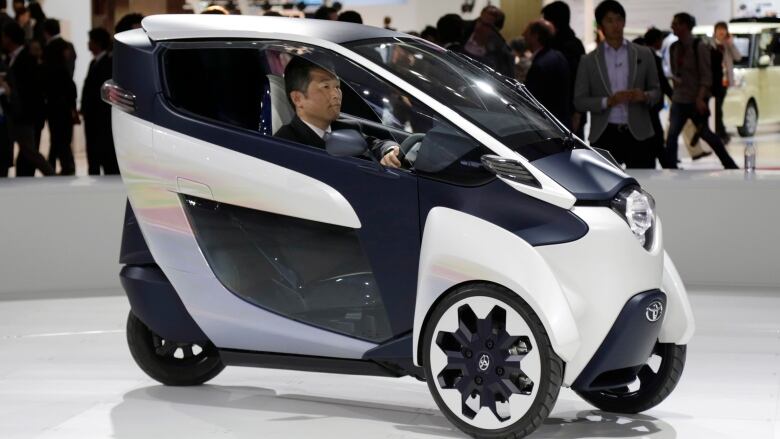The electric car and Canada's oil future
Oil demand will peak eventually, but what then?

By now, it's well understood that the world will get off oil.
The timing of that transition, however, is no trifling matter. And not just for the planet's fight against climate change, although the stakes there clearly couldn't be higher, but also for decisions Canada faces right now about major energy infrastructure projects such as TransCanada's Energy East proposal and the planned expansion of Kinder Morgan's Trans Mountain pipeline to the West Coast.
In a national poll commissioned by CBC of almost 2,100 Canadians between Feb. 16-26, EKOS found that 92 per cent of those surveyed believe the oil and gas industry is currently important to Canada's economy. When asked about the industry's future importance, however, the number fell to 68 per cent.
In the broader context of global governments that are hurrying the shift to greener sources of energy, a perception that the sun will one day set on the oil economy is understandable. At the same time, how long it takes for that future to arrive and what happens in the meantime is worth more than passing consideration.
Right now, the best guesses of oil experts see daily crude demand, currently around 95 million barrels, reaching a high next decade in the neighbourhood of 100 to 105 million barrels a day.
"There is a point we will reach peak demand," said Peter Tertzakian, chief energy economist at ARC Financial and the author of several books that consider how the world will transition away from oil. "Having said that, we're going to be closing in on 1,100 barrels a second, which is a staggering amount of oil."
An electric car in every driveway?
Once demand eventually crests, how quickly global oil consumption declines will depend in large part on the types of vehicles that are parked in the world's driveways.
Out of every barrel of oil production, just more than two-thirds is used for transportation. About 17 per cent of that goes toward fuelling planes, trains and boats, while the remaining 50 per cent is burned by passenger vehicles.

The promising news is that may be starting to happen.
"Every automaker is making very progressive and bullish statements about how electric-drive products are the future of their company," said Nic Lutsey, program director at the International Council on Clean Transportation. "The overall progression in all of the discussions is that electric vehicles are the future and the only real question is how quickly can all this happen."
On the question of timing, even electric vehicle advocates like Lutsey know they need to take a deep, patient breath.
"It's going to take decades," he said. "This can't happen faster than decades, because there are just so many parts to manufacturing, then manufacturing at scale and getting the cost down for a mainstream market."
1.1 billion vehicles
Electric vehicle sales, which now measure in the hundreds of thousands annually, have ramped up sharply in the past few years. However, some quick, back-of-the-envelope figuring shows even big increases in the number of electric cars on the road won't knock the internal combustion engine from its perch any time soon.

According to Tertzakian's calculations, selling a million electric vehicles in a year would displace about 50,000 barrels a day of oil consumption. Even a ten-fold increase in that number would only remove a half million barrels of demand from a market that, in another decade, will be around 100 million barrels a day.
And that's a glass-half-full scenario. Consider how long it will take to replace a global vehicle fleet of 1.1 billion cars and trucks if electric vehicle penetration is in the five percent range, which is still more than triple current levels in most major markets.
If global oil demand can be counted on to stay robust even after its peak, does that make building a new pipeline an easy decision? Not necessarily. The long-term outlook for crude consumption is only part of an equation that's now far messier than the oil industry would like.
Damaged trust
Pipeline advocates believe that education is the key to getting a project built. Opposition, the thinking goes, will melt once the non-oil producing parts of the country learn about the economic merits of a new pipeline and the existing safety record of existing infrastructure. Given that stance, it remains unclear whether the energy industry accepts the idea that deeper work needs to be done to get onside with a skeptical public.
"Part of the answer to the pipeline question is to improve the level of trust that society has for the pipeline companies, their suppliers, their governments and their regulators," said Len Coad, public policy research director at the Conference Board of Canada.

The oil industry may wish it otherwise, but the pipeline debate, in the minds of Canadians, now includes a discussion about emissions from the oilsands. In that light, it's difficult to see how a pipeline gets built unless the country believes that Alberta is a responsible actor on the climate change front.
For all the angst that new climate plans coming from Alberta and Ottawa are triggering in the oilpatch, it's no small irony that greener policies are actually designed to protect the energy industry's long-term health rather than cause it financial hardship. In a carbon-constrained world, after all, Canada needs to consider the types of barrels it's supplying to the global market both today and decades from now.
"If we're going to fill the pipe with high-cost, high-carbon oil, then it's difficult to justify," Tertzakian said. "If we're going to have a concerted strategy that Canada is going to be the supplier to the world of lower-carbon, lower-cost oil then we can be in business a long time."












_(720p).jpg)


 OFFICIAL HD MUSIC VIDEO.jpg)
.jpg)



























































































